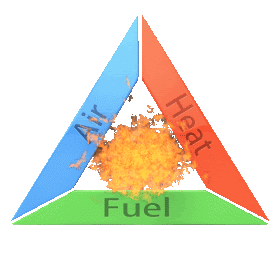Prevention
of fires is the foremost goal in any industry. The Aluminium Plant Safety Blog
has posted incidents and commented on how our industry prevents fires successfully.
When a fire does occur in our plants, there are a myriad of options to extinguish
the flames. From a combination of onsite
fire brigades, local fire departments, to fire suppression systems. Carbon
dioxide gas is the most widely known agent in fire suppression system.
For fire
extinguishing purposes the advantages of carbon dioxide gas have been long
known. If we look at the fire triangle, we realize that an interaction between
fuel, air (oxygen) and heat is necessary to produce a fire condition. When
these three elements are present in a proper relationship, fire will result.
Carbon dioxide extinguishes fire by physically attacking all three points of
the fire triangle. Carbon dioxide has been used for fire suppression as early
as 1914, the Bell Telephone Company of Pennsylvania installed a number of seven
pound capacity portable CO2 extinguishers for use on electrical wiring and
equipment. By the 1920's, automatic systems utilizing carbon dioxide were
available. In 1928, work on the NFPA (National Fire Protection Assoc.) Standard
for carbon dioxide extinguishing systems was begun. Here is a recent story:
A
structure fire at the Novelis plant in Fairmont, West Virginia, USA early
Sunday morning is being investigated.
The Marion County 911 Center received a call about the
incident around 4:40 a.m. Sunday and the Fairmont Fire Department responded, a
dispatcher reported.
No one was hurt during the fire. Novelis, located on Speedway
Avenue in Fairmont, works in aluminum rolled products.
Local Fire Chief explained that the facility’s Cardox CO2
System put the mill fire out right away, but the fire had gone up into the
large chimney system. The flames could be spotted from East Park Avenue, he
said.
“They did evacuate the building for a while, until everything
was under control,” Local Fire Chief said.
The Fairmont Fire Department used a ladder truck and a pumper
for the situation, he said. About 13 city firefighters were on site working
with the fire crew at Novelis, called the Novelis Fire Brigade.
Emergency responders began leaving the scene around 6 a.m.,
Emerick said.
“The fire occurred at the plant and all employees were safely
accounted for and no injuries,” said a senior communications manager for Novelis
North America.
“The incident was isolated to a piece of equipment on the
outside roof of the plant and the fire was extinguished both by the Novelis
Fire Brigade and the Fairmont Fire Department. We have an internal
investigation under way to determine the cause.”
The senior communications manager for Novelis North America said
Novelis is also looking into the damages caused by the incident.
“The plant is currently running, but we do have one portion
shut down for repairs,” the senior communications manager for Novelis North
America said.
The Aluminium Plant Safety
Blog would like to commend Novelis Fairmont facility for successfully
extinguishing this fire. The used a combination of carbon dioxide fire suppression
system, their own fire brigade, and local fire department(s). As well as a
successfully completing an emergency evacuation resulting in no injuries.
Further information
regarding carbon dioxide suppression systems can be found at the National Fire
Protection Association, click here.
Occupational Safety &
Health Administration (OSHA) has information pertaining toward fixed extinguishing systems here.
Please comment.

In this incident, carbon dioxide was used to extinguish an aluminum fire. It is also apparent that carbon dioxide is reducible by aluminum under certain temperature and pressure regimes (consult any Ellingham diagram)which means a reaction is at least possible. Carbon dioxide is not recommended, for example, for aluminum powder fires.
ReplyDeleteWhat are reader's comments?